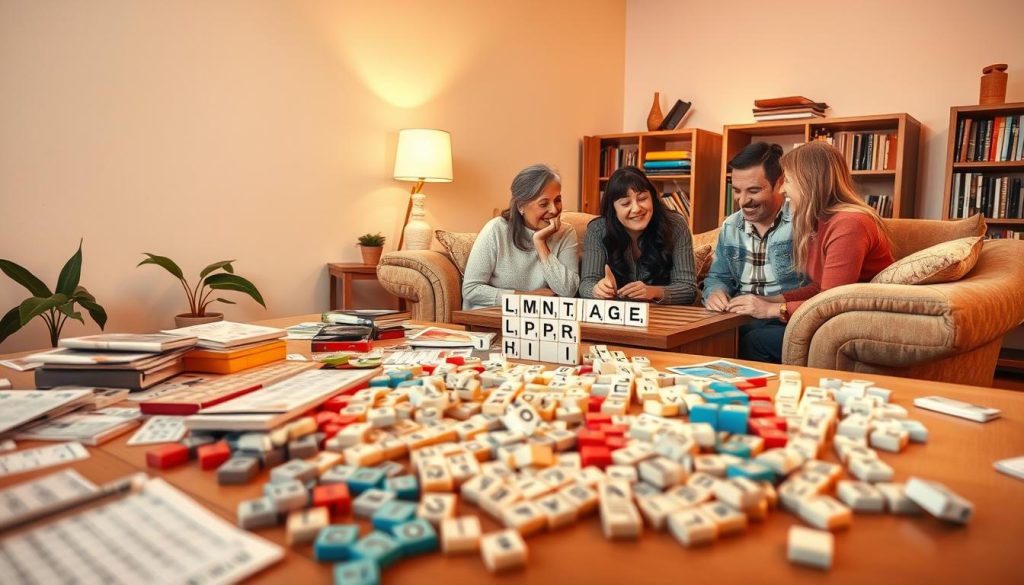As we age, maintaining cognitive health becomes increasingly important. Engaging in cognitive training through various activities can significantly impact our brain’s ability to function effectively.
Brain games are a popular method for improving cognitive function. These games challenge the brain and help build cognitive reserve, potentially reducing the risk of cognitive decline.
By incorporating brain health strategies into daily life, individuals can take proactive steps towards maintaining their cognitive abilities. This introduction sets the stage for exploring the most effective cognitive games and training methods.
Key Takeaways
- Engaging in cognitive training can improve brain function.
- Brain games can help build cognitive reserve.
- Maintaining brain health is crucial as we age.
- Cognitive decline can be potentially reduced through cognitive activities.
- Incorporating brain health strategies into daily life is beneficial.
The Science Behind Cognitive Decline
Understanding the science behind cognitive decline requires examining the intricate processes of brain aging and the various risks involved. As we age, our brains undergo a series of changes that can affect cognitive function.
Understanding Brain Aging Processes
Brain aging is a complex process that involves the gradual deterioration of brain cells and the connections between them. This natural process can be influenced by a range of factors, including genetics, lifestyle, and environmental exposures.
Key changes include:
- Reduction in the number of neurons and synapses
- Accumulation of amyloid plaques and tau tangles, hallmarks of Alzheimer’s disease
- Changes in brain structure, such as shrinkage in certain areas
Common Risk Factors for Cognitive Decline
Cognitive decline is not solely the result of aging; various risk factors can accelerate or contribute to its progression.
Lifestyle Factors
Lifestyle choices play a significant role in determining the risk of cognitive decline. Factors such as physical inactivity, smoking, and a diet high in processed foods and low in essential nutrients can increase the risk.
A healthy lifestyle, including regular physical activity and a balanced diet, is crucial for maintaining cognitive health.
Medical Conditions
Certain medical conditions can significantly impact cognitive function. Conditions such as diabetes, hypertension, and cardiovascular disease have been linked to an increased risk of cognitive decline.
“Managing chronic health conditions is critical for reducing the risk of cognitive decline.”
By understanding the risk factors and the processes involved in brain aging, individuals can take proactive steps to mitigate their risk of cognitive decline.
How Cognitive Training Works
By understanding how cognitive training works, individuals can take proactive steps towards maintaining their brain health. Cognitive training is based on the concept that the brain can change and adapt throughout life.
Neuroplasticity: Your Brain’s Ability to Change
Neuroplasticity refers to the brain’s ability to form new neural connections, allowing it to adapt and change. “The brain’s ability to change is the key to cognitive training’s effectiveness.” This concept challenges the long-held idea that the brain is a fixed, unchangeable entity that cannot be modified after a certain age.
Building Cognitive Reserve Through Mental Exercise
Cognitive reserve is the brain’s ability to adapt and compensate for age-related changes or brain pathology. Engaging in mentally stimulating activities helps build this reserve, potentially delaying the onset of cognitive decline. As Dr. Yaakov Stern, a renowned neuroscientist, notes,
“Cognitive reserve is like having a savings account for your brain; the more you have, the more you can withstand cognitive challenges.”
The Use-It-or-Lose-It Principle
The “use-it-or-lose-it” principle suggests that cognitive abilities that are not used regularly will decline over time. Engaging in cognitive training exercises helps maintain and improve these abilities. Regular mental exercise can be as simple as learning a new skill, reading, or engaging in puzzles and brain games.
Brain Games That Actually Prevent Cognitive Decline
In the realm of cognitive training, distinguishing between marketing hype and scientifically-backed brain games is essential for preventing cognitive decline. With an aging population and a growing concern about dementia, the demand for effective cognitive training tools has never been higher.
Evidence-Based Criteria for Effective Brain Games
Effective brain games are those that are backed by scientific evidence, demonstrating a clear impact on cognitive function. These games typically target specific cognitive domains, such as memory, attention, or processing speed, and are designed to challenge the brain in a progressive manner.
Key characteristics of effective brain games include:
- Personalization to the user’s cognitive profile
- Adaptive difficulty that adjusts to the user’s performance
- Engagement through enjoyable and challenging tasks
Distinguishing Scientifically-Backed Games from Marketing Hype
With so many brain games on the market, it can be challenging to separate those that are genuinely effective from those that are merely marketing hype. To make an informed decision, look for games that have been scientifically validated and published in reputable journals.
Red Flags in Brain Training Claims
Be cautious of brain training programs that make exaggerated claims, such as promising to prevent or cure dementia. Also, be wary of programs that lack transparency about their methods or results. A scientifically-backed program will provide clear evidence of its effectiveness.
By being aware of these factors and choosing evidence-based brain games, individuals can take a proactive step towards maintaining their cognitive health and potentially preventing cognitive decline.
Memory-Enhancing Games and Activities
Engaging in memory-enhancing games can significantly improve your brain’s ability to recall information. These games not only challenge the brain but also make the process enjoyable and engaging.
There are various types of memory-enhancing games and activities available, ranging from digital applications to traditional games. Let’s explore some of the most effective options.
Digital Memory Applications
Digital memory applications have gained popularity due to their accessibility and effectiveness. Apps like Lumosity and BrainHQ offer a range of memory-enhancing games designed by neuroscientists.
- Lumosity provides personalized brain training programs.
- BrainHQ offers a comprehensive brain training system with a focus on memory.
Traditional Memory Games
Traditional memory games have been around for decades and are still effective today. Games like Concentration and Name Recall are excellent for improving memory.
| Game | Description | Benefits |
|---|---|---|
| Concentration | A card game where players match pairs. | Improves short-term memory. |
| Name Recall | A game where players try to remember names and faces. | Enhances memory for names and faces. |
DIY Memory Challenges
Creating your own memory challenges can be a fun and effective way to improve memory. Try activities like:
- Memorizing a shopping list without writing it down.
- Recalling the names of historical figures or capitals.
Problem-Solving and Strategy Games
Problem-solving games are not just entertaining; they also offer substantial cognitive benefits. Engaging in these activities can enhance various cognitive skills, including decision-making, critical thinking, and analytical reasoning.
Chess, Go, and Strategic Board Games
Games like chess and Go are renowned for their strategic depth and complexity. They require players to think critically and anticipate multiple outcomes, thereby improving cognitive flexibility and problem-solving skills. Strategic board games challenge players to adapt and adjust their strategies based on the game’s progression, enhancing cognitive reserve.
Logic Puzzles and Their Cognitive Benefits
Logic puzzles, such as Sudoku and other brain teasers, are designed to challenge the brain and improve cognitive functions. They enhance logical reasoning and problem-solving abilities, contributing to overall brain health.
How Strategy Games Build Decision-Making Skills
Strategy games require players to make informed decisions, often under time pressure or with limited information. This practice improves decision-making skills by teaching players to weigh options, consider consequences, and choose the best course of action. Regular engagement in these games can lead to better decision-making in real-life situations.
Language and Word Games for Brain Health
Engaging in language and word games can be a fun and effective way to support brain health. These activities challenge the brain and help build cognitive reserve, potentially delaying cognitive decline.
Crosswords, Scrabble, and Word Searches
Games like crosswords, Scrabble, and word searches are popular for their cognitive benefits. They enhance vocabulary, improve memory, and boost problem-solving skills. For instance, crosswords require players to recall words based on clues, exercising memory and linguistic abilities.

Language Learning Apps and Their Cognitive Impact
Language learning apps, such as Duolingo, offer a modern approach to cognitive training. They not only teach new languages but also improve memory, concentration, and cognitive flexibility. Learning a new language stimulates the brain’s ability to adapt and change.
Reading as Cognitive Exercise
Reading is another powerful tool for maintaining brain health. It exposes readers to new vocabulary, sentence structures, and ideas, thereby enhancing linguistic and cognitive abilities. Regular reading can also reduce stress and improve empathy.
Incorporating these language and word games into your routine can be both enjoyable and beneficial for your brain health. Whether through traditional games or modern apps, challenging your brain with language activities supports overall cognitive well-being.
Number and Mathematical Brain Challenges
Number puzzles and mental arithmetic games are effective tools for improving cognitive resilience. Engaging in these activities can strengthen your brain’s ability to handle complex problems.
These cognitive challenges come in various forms, including Sudoku, number sequences, and mental arithmetic exercises. They require concentration, working memory, and logical reasoning.
Sudoku and Number Puzzles
Sudoku is a popular number puzzle that requires players to fill in missing numbers in a grid. It enhances logical reasoning and working memory.
Mental Arithmetic Games and Applications
Mental arithmetic games improve your ability to perform calculations quickly and accurately. Apps like Math Games and Mental Arithmetic provide engaging exercises.
How Math Games Strengthen Working Memory
Math games strengthen working memory by requiring players to hold and manipulate numbers in their minds. This improves cognitive flexibility and processing speed.
| Math Game Type | Cognitive Benefit |
|---|---|
| Sudoku | Improves logical reasoning and working memory |
| Mental Arithmetic | Enhances processing speed and cognitive flexibility |
Physical Activities That Enhance Brain Function
The connection between physical activity and brain health is well-established, with numerous benefits for cognitive function. Engaging in regular physical exercise not only improves overall health but also enhances brain function, potentially preventing cognitive decline.
Dance, Tai Chi, and Coordination Exercises
Activities that challenge coordination and balance, such as dance and Tai Chi, are particularly beneficial for brain health. These exercises require concentration, memory, and physical coordination, thereby engaging multiple cognitive domains.
- Dance classes, such as salsa or ballet, improve memory and spatial awareness.
- Tai Chi enhances balance and reduces the risk of falls, while also improving cognitive function.
- Coordination exercises, like juggling, can improve cognitive flexibility and processing speed.
Sports That Combine Physical and Mental Challenges
Sports that require strategy and mental effort, in addition to physical exertion, offer enhanced cognitive benefits. Examples include tennis, basketball, and golf, which demand quick decision-making, problem-solving, and concentration.
The Mind-Body Connection in Cognitive Health
The mind-body connection plays a crucial role in cognitive health. Activities that combine physical exercise with mental challenges stimulate both body and brain, promoting overall well-being and potentially reducing the risk of cognitive decline.
By incorporating physical activities that challenge both the body and the mind into your routine, you can take a proactive approach to maintaining cognitive health and enhancing brain function.
Social Games and Their Protective Effects
Social interaction through games is emerging as a key factor in maintaining brain health. Engaging in social activities, particularly those that involve games, can stimulate various cognitive domains while fostering social connections.
Card Games and Social Interaction Benefits
Card games like bridge, poker, and solitaire are not only entertaining but also provide significant cognitive benefits. They require strategy, memory, and concentration, making them ideal for challenging multiple cognitive domains. Moreover, card games often involve social interaction, which is crucial for emotional well-being and cognitive health.
Group Activities That Challenge Multiple Cognitive Domains
Group activities, such as team sports, board game clubs, and trivia nights, offer a mix of social interaction and cognitive stimulation. These activities can help build cognitive reserve and reduce the risk of cognitive decline.
How Social Engagement Prevents Cognitive Decline
Social engagement through games and group activities can prevent cognitive decline by reducing stress, improving mood, and enhancing cognitive flexibility. Key benefits include:
- Improved memory and concentration
- Enhanced problem-solving skills
- Better emotional regulation
By incorporating social games into your lifestyle, you can enjoy these benefits while having fun and staying connected with others.

Digital Brain Training Platforms: What Works
As digital brain training continues to gain popularity, it’s essential to separate fact from fiction when it comes to choosing the right platform. With so many options available, understanding what makes a digital brain training platform effective is crucial.
Evidence-Based Applications
Platforms like BrainHQ and CogniFit have garnered attention for their evidence-based approaches to brain training. These platforms offer a range of cognitive exercises backed by scientific research, focusing on areas such as attention, memory, and processing speed.
Selecting the Right Platform for Your Needs
When choosing a digital brain training platform, several factors come into play. It’s essential to consider what type of cognitive training you’re looking for and whether the platform offers personalized programs.
Subscription vs. Free Options
Many platforms offer both free and subscription-based models. While free options can be a good starting point, subscription services often provide more comprehensive training programs and progress tracking.
Transfer of Skills to Real-World Function
A key consideration is whether the skills learned on the platform transfer to real-world functions. Look for platforms that have studies or evidence supporting their claims of real-world impact.
| Platform | Key Features | Cost |
|---|---|---|
| BrainHQ | Personalized brain training, attention and memory exercises | Subscription-based |
| CogniFit | Cognitive assessments, tailored training programs | Subscription-based, with some free content |
| Lumosity | Varied cognitive games, progress tracking | Subscription-based, with some free games |
By carefully evaluating these factors and choosing a platform that aligns with your needs, you can maximize the benefits of digital brain training.
Creating a Sustainable Cognitive Training Routine
Developing a sustainable cognitive training habit is key to long-term brain health benefits. Consistency is crucial when it comes to cognitive training, and establishing a routine can make a significant difference in maintaining brain health over time.
Recommended Frequency and Duration
To maximize the benefits of cognitive training, it’s recommended to practice regularly. Aim for a frequency of at least 3-4 times a week, with sessions lasting around 20-30 minutes. This consistent practice helps in reinforcing new neural connections.
Balancing Different Types of Cognitive Challenges
A well-rounded cognitive training routine should include a variety of challenges to keep the brain engaged. This can include memory games, problem-solving activities, and language exercises. Balancing different types of cognitive challenges not only keeps the training interesting but also ensures comprehensive cognitive improvement.
Tracking Progress and Adjusting Difficulty
It’s essential to track your progress and adjust the difficulty level of your cognitive training accordingly. Many digital platforms offer progress tracking features that can help you identify areas of improvement. Regularly assessing your performance allows you to tailor your training to your needs, making it more effective.
Integrating Brain Games Into Daily Life
Integrating brain games into your daily routine can be straightforward. You can start by incorporating short cognitive training sessions into your daily schedule, such as during your morning coffee or right before bed. Here are some tips to make it a habit:
- Set a specific time and day for cognitive training
- Begin with short sessions and gradually increase the duration
- Mix different types of cognitive games to keep it interesting
- Use reminders or alarms to stay on track
By making cognitive training a part of your daily routine, you’ll be more likely to stick with it and enjoy the long-term benefits.
Conclusion
Engaging in cognitive games and brain training activities is a proven strategy for preventing cognitive decline and maintaining brain health. Throughout this article, we have explored various types of cognitive games, including memory-enhancing games, problem-solving and strategy games, language and word games, and number and mathematical brain challenges.
By incorporating these activities into your daily routine, you can build cognitive reserve, improve neuroplasticity, and reduce the risk of cognitive decline. Digital brain training platforms, such as BrainHQ and CogniFit, offer a range of evidence-based programs tailored to individual needs.
To maintain brain health, it is essential to create a sustainable cognitive training routine, balancing different types of cognitive challenges. By doing so, you can take proactive steps towards preventing cognitive decline and promoting overall brain health. Start your cognitive health journey today and discover the benefits of cognitive games for yourself.






